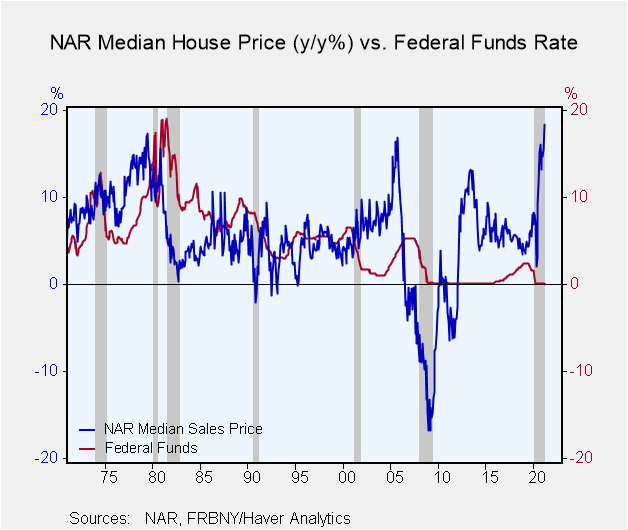 Global| Apr 26 2021
Global| Apr 26 2021Houses on Fire: 2021 Price Increases Exceed Those of 1979
|in:Viewpoints
Summary
The National Association of Realtors reported that existing house prices in March were up 18.4% over the same period one year ago. That increase eclipses the prior record increase of 17.4% recorded in June 1979. In 1979, Mr. Paul [...]
 The National Association of Realtors reported that existing house prices in March were up 18.4% over the same period one year ago. That increase eclipses the prior record increase of 17.4% recorded in June 1979.
The National Association of Realtors reported that existing house prices in March were up 18.4% over the same period one year ago. That increase eclipses the prior record increase of 17.4% recorded in June 1979.
In 1979, Mr. Paul Volcker was the Chairman of the Federal Reserve. Volcker came into office with the primary goal to restore price stability. House prices were part of the consumer price index in 1979, and it, along with other price increases, was seen as creating unstable economic and financial conditions. Volcker lifted official rates to near 20% to break the back of inflation. The outcome was nearly three years of economic recession from 1980 to 1982.
In 2021, Mr. Jerome Powell is the Chairman of the Federal Reserve. Mr. Powell does not view house price increases the same way as Mr. Volcker. Perhaps its because house price is not part of the consumer price index, so it does not create the same systemic fears of 1979. Also, policymakers nowadays believe that "macroprudential" tools (i.e., limits of loan-to-value ratio and caps on debt-service to income) are a better way to limit potential asset bubbles and promote financial stability. The economic and financial outcome is unknown at this time, but history does not paint a bright picture.
Lessons from broad (1979) or narrow (2000s-housing) inflation cycles show the longer it takes to break the spiral, the greater the adverse economic and financial outcomes. That's because inflation cycles create income and paper wealth, while the reversal triggers widespread income and financial losses, sometimes bigger than the initial gains.
Monetary policy that supports the extension of easy money when house prices are rising at record rates makes no sense. It's one thing to misread the tea leaves of an asset bubble, but it's another thing to be the enabler.
Viewpoint commentaries are the opinions of the author and do not reflect the views of Haver Analytics.Joseph G. Carson
AuthorMore in Author Profile »Joseph G. Carson, Former Director of Global Economic Research, Alliance Bernstein. Joseph G. Carson joined Alliance Bernstein in 2001. He oversaw the Economic Analysis team for Alliance Bernstein Fixed Income and has primary responsibility for the economic and interest-rate analysis of the US. Previously, Carson was chief economist of the Americas for UBS Warburg, where he was primarily responsible for forecasting the US economy and interest rates. From 1996 to 1999, he was chief US economist at Deutsche Bank. While there, Carson was named to the Institutional Investor All-Star Team for Fixed Income and ranked as one of Best Analysts and Economists by The Global Investor Fixed Income Survey. He began his professional career in 1977 as a staff economist for the chief economist’s office in the US Department of Commerce, where he was designated the department’s representative at the Council on Wage and Price Stability during President Carter’s voluntary wage and price guidelines program. In 1979, Carson joined General Motors as an analyst. He held a variety of roles at GM, including chief forecaster for North America and chief analyst in charge of production recommendations for the Truck Group. From 1981 to 1986, Carson served as vice president and senior economist for the Capital Markets Economics Group at Merrill Lynch. In 1986, he joined Chemical Bank; he later became its chief economist. From 1992 to 1996, Carson served as chief economist at Dean Witter, where he sat on the investment-policy and stock-selection committees. He received his BA and MA from Youngstown State University and did his PhD coursework at George Washington University. Honorary Doctorate Degree, Business Administration Youngstown State University 2016. Location: New York.


